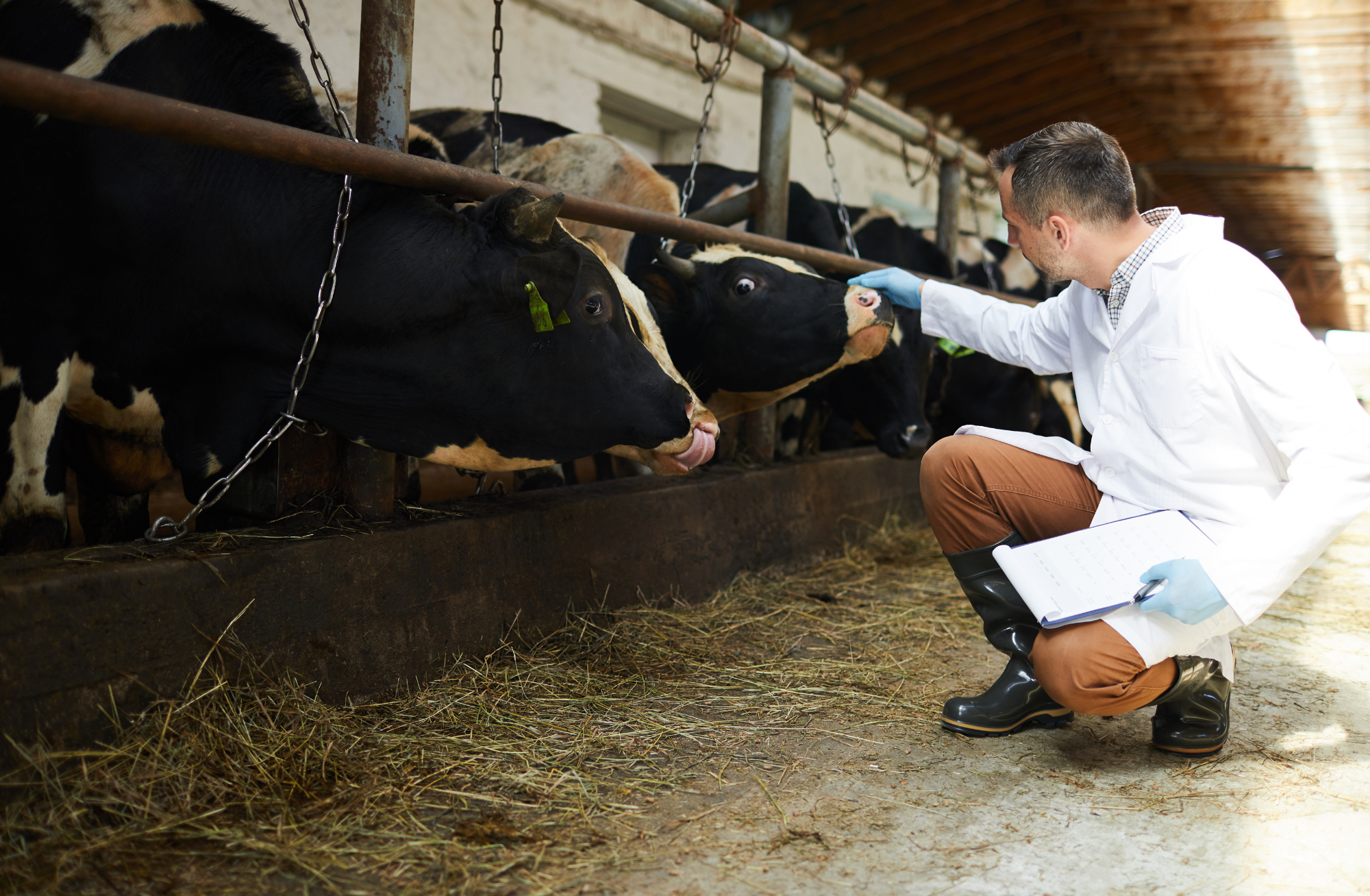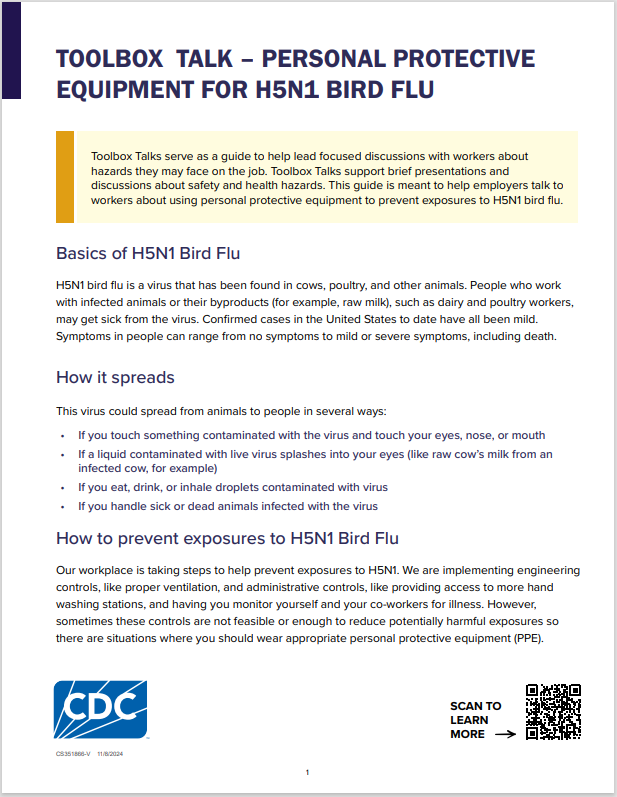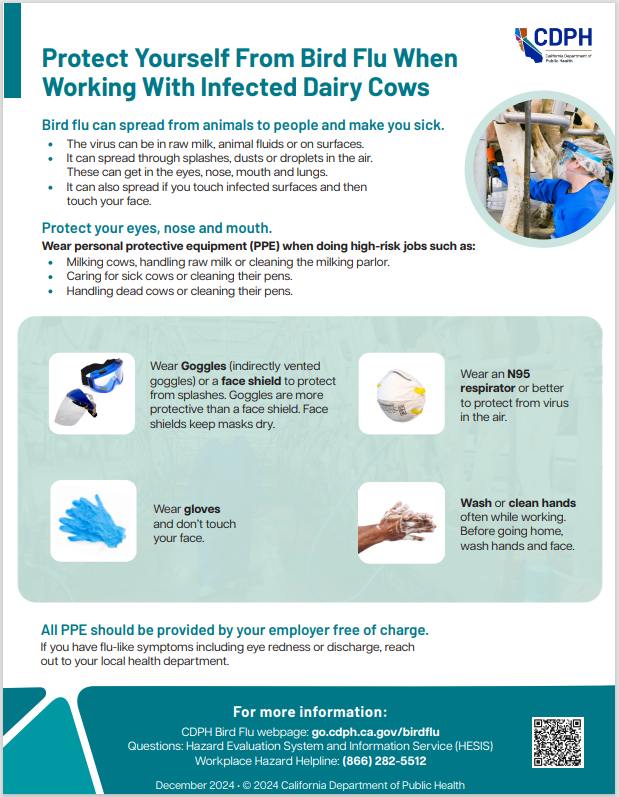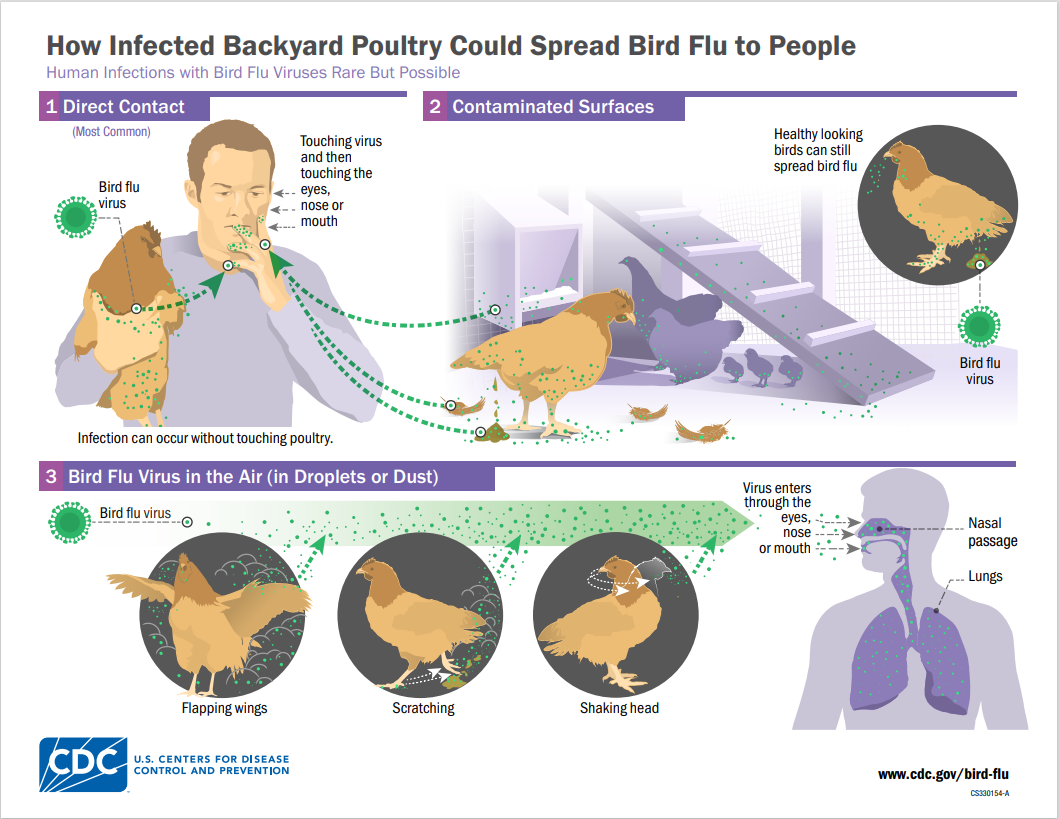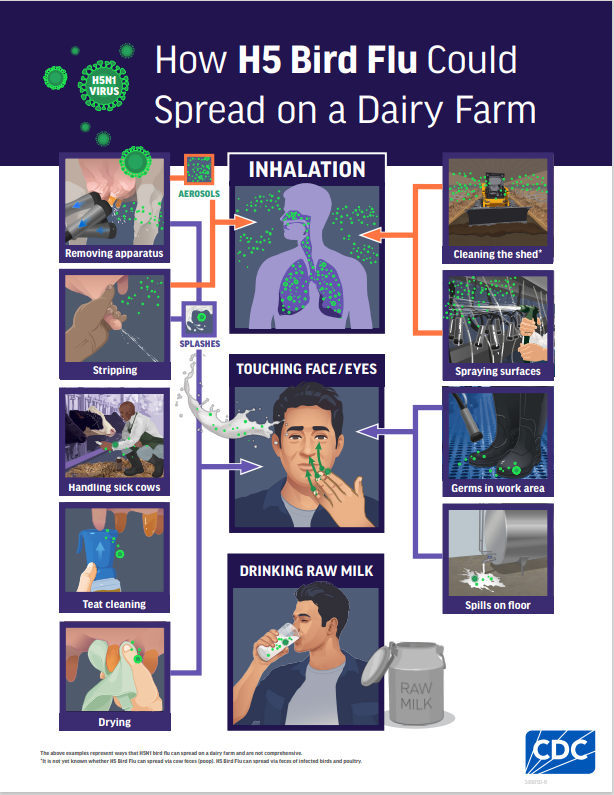Avian Influenza (H5N1 Bird Flu)
Bird flu, also known as avian influenza A (H5N1) or highly pathogenic avian influenza (HPAI), is a type of influenza virus that causes highly infectious and severe respiratory disease in birds and mammals. It is causing outbreaks in poultry and dairy cows in the U.S., and some human cases have been identified in people who have had close contact with infected dairy cows and poultry. Although the current public health risk for the general public is low, the CDC and CDPH is carefully watching the situation and working with states to monitor people with animal exposures.
CDPH recommends that personal protective equipment (PPE), such as eye protection (face shields or safety goggles), respirators (N95 masks), and gloves be worn by anyone working with animals or materials that are infected or potentially infected with the bird flu virus. Wearing PPE helps prevent infection. Please see CDPH’s Worker Protection from Bird Flu for full PPE guidance.
Public Health’s response to bird flu, in collaboration with the Office of the Agricultural Commissioner, Animal Services, and Environmental Health, includes enhanced biosecurity at local farms, securing personal protective equipment (PPE) and flu vaccines for farm workers, and ongoing health monitoring.
No H5N1 cases of bird flu in humans have been identified in Riverside County at this time. The current risk to the public remains low. For the most up to date health guidance and data on bird flu cases in California, please visit CDPH’s Current Bird Flu Situation dashboard.
News Releases:
*Last Updated: January 29, 2025
Criteria for Submission Through a Public Health Laboratory
Domestic animal species submitted by veterinarians for Influenza A testing through a public health laboratory that meet the following clinical and history criteria:
1) The cat must have one or more of the following clinical signs (after other possible etiologies have been ruled out)
- Acute onset respiratory illness (e.g., dyspnea, tachypnea, oculonasal discharge, thoracic radiographic findings consistent with pneumonia)
- Neurologic illness (acute and rapidly progressive encephalopathy, ataxia, paralysis, seizures, blindness/chorioretinitis)
- Lethargy, loss of appetite, and fever (especially with neutropenia/leukopenia, thrombocytopenia, and/or hepatopathy)
AND
2) A history of one of the following within the 2 weeks preceding onset of the present illness:
- Consumption of raw milk, raw meat/egg, or raw pet food
- Hunting and/or consumption of wild birds or poultry
- Close proximity to or direct contact with dairy farm or poultry farms with H5 detection
- Lives in the same household or have frequent contact with a cat presumptive or confirmed H5 infection
Frequently Asked Questions
- H5N1 Bird Flu Symptoms: What to Watch For
-
Symptoms of avian influenza in humans can range from mild to severe and may include:
- Eye redness or discharge
- Cough
- Sore throat
- Runny or stuffy nose
- Diarrhea
- Vomiting
- Muscle or body aches
- Headaches
- Fatigue
- Trouble breathing
- Fever (100°F or higher)
- Pneumonia
- Seizures
Severe cases can lead to hospitalization or death.
Most dairy workers infected in the U.S. reported mild illness, with the main symptoms being conjunctivitis or eye infection.
- How long after exposure do symptoms appear?
-
People who are exposed should monitor themselves daily for signs and symptoms of new illness for up to 10 days after the last known exposure. The estimated incubation period for human infection with bird flu virus is generally three to five days but has been reported to be as long as seven to 10 days.
If you feel sick or believe you were exposed to avian flu, you should immediately isolate and notify your doctor and local public health department to get timely testing and treatment.
- What if I was exposed?
-
- Seek medical care if experiencing symptoms within 10 days after exposure to infected animals.
- Testing is available for those with suspected avian influenza infection.
- Who is at risk?
-
- People who work with or are around animals infected with H5N1 Bird Flu or infected raw milk are at higher risk. This includes any contact with animal fluids, feces, feathers, or their environments.
- Some high-risk groups include farm workers, wildlife workers, veterinarians, and other individuals in close contact with birds or livestock.
- How is H5N1 Bird Flu diagnosed?
-
The A(H5N1) virus infection in people cannot be diagnosed by clinical signs and symptoms alone. Laboratory testing is needed to confirm A(H5N1) virus infection in humans. Testing is usually done by a local or state Public Health Laboratory.
- Is there treatment or a vaccine for H5N1bird flu?
-
- There is a Food and Drug Administration-approved antiviral treatment for seasonal flu that can be used for A(H5N1) virus infection. Antiviral treatment is recommended as soon as possible for outpatients and hospitalized patients who are suspected, probable, or confirmed cases of human infection with H5N1 Bird Flu. Treatment should be discussed with your healthcare provider
- Human vaccines for the prevention of A(H5N1) virus infection are currently available in the United States. Although seasonal influenza vaccines do not provide any protection against human infection with A(H5N1) viruses, an annual influenza vaccination is recommended.
- How is bird flu diagnosed and treated?
-
A bird flu virus infection in people cannot be diagnosed by clinical signs and symptoms alone. Laboratory testing by a local or state public health laboratory is needed to confirm bird flu virus infection in humans.
If an infection is confirmed, there is a FDA approved antiviral treatment for seasonal flu that can be used for bird flu virus infection. Antiviral treatment is recommended as soon as possible for outpatients and hospitalized patients who are suspected, probable, or confirmed cases of human infection with bird flu. Treatment should be discussed with your healthcare provider.
- How H5N1 Bird Flu spreads between birds, mammals, and potentially humans
-
- People rarely get bird flu, but when they do, it is most often acquired through close, prolonged, and unprotected contact (no gloves, protective wear, face masks, respirators, or eye protection) with infected birds or other animals.
- Human infections with avian influenza viruses can happen when enough virus gets into a person’s eyes, nose, or mouth, or inhaled. This can happen when the virus is in the air in droplets or dust and a person breathes it in or when a person touches something that has the virus on it and then touches their mouth, eyes, or nose, according to the CDC.
- Bird-to-Bird: Direct contact, contaminated surfaces, droppings, or secretions.
- Bird-to-Animal: Contact with infected birds, raw milk, or contaminated environments.
- Animal-to-Human: Rare, but possible through close exposure to infected animals.
- How can I prevent the spread of bird flu?
-
-
Avoid contact with infected animals, including wild birds and other animals infected with or suspected to have bird flu. Wild birds can be infected with bird flu even if they don't look sick.
-
Always wash hands thoroughly with soap and water after contact with animals.
-
Wear personal protective equipment (PPE) if you must work with infected animals, including respirators (N95 masks), eye protection (face shields or safety goggles) and gloves.
-
Get the seasonal flu vaccine. Although the seasonal flu vaccine will not protect against bird flu, it can decrease the risk of being infected with both viruses at the same time and reduce the chance of severe illness from seasonal flu.
-
Only consume pasteurized dairy products. Do not touch or consume raw milk or raw milk products, especially from animals with confirmed or suspected bird flu infection. Pasteurized milk and dairy foods are safe to consume because the pasteurization process inactivates the bird flu virus.
-
- What should I do if I find a dead bird?
-
It is important to avoid contact with wild or domestic birds that appear ill or have died. If you do encounter a sick or dead bird, call to report it because wildlife agencies regularly investigate reports of sick or dead animals.
Poultry owners with flocks that have experienced any unusual/suspicious illness or deaths should call the California Department of Food and Agriculture’s (CDFA) Sick Bird Hotline at: 866-922-BIRD (2473).
- Is it safe to drink milk?
-
The CDC issued a Health Alert Network Health Advisory with recommendations that support only drinking pasteurized milk and eating dairy products made from pasteurized milk. Most of the nutritional benefits of drinking milk are available from pasteurized milk. It is important not to consume unpasteurized “raw” milk or products made from unpasteurized milk because it can contain bacteria or viruses, such as bird flu, which can cause serious illness, hospitalization, or death.
- What does it mean if H5N1 is detected in wastewater?
-
Wastewater surveillance is an early detection tool that can help communities prepare for and take action to address increasing cases of infectious diseases. If H5 is detected in wastewater, we can conclude that material entering the sanitary sewer contains nucleic acids from an influenza virus with the H5 subtype (e.g., H5N1). There are no other known H5 subtypes circulating in the United States at the present time, therefore, H5N1 is very likely the cause of the H5 detection in wastewater.
- Sick/ Dead Birds
-
Backyard Biosecurity for Poultry
- CDFA Sick Bird Hotline: 1 (866) 922-BIRD (2473)
- USDA Sick Bird Hotline: (866) 536-7593
- Website: https://www.cdfa.ca.gov/ahfss/animal_health/BioSpecies/BioPoultry.html
How do I avoid getting H5N1 Bird Flu?
- Prevention & ways to protect yourself
-
- Avoid contact with infected animals. Avoid direct contact with birds and other animals that could be infected with bird flu. Wild birds can be infected with bird flu even if they don't look sick.
- Get the seasonal flu vaccine. CDPH recommends that all Californians, especially workers at risk for exposure to bird flu, receive a seasonal flu vaccine. While the seasonal flu vaccine will not protect against bird flu, getting vaccinated can lower the risk of being infected with both seasonal flu and bird flu at the same time. Getting vaccinated also reduces the chance of severe illness from seasonal flu.
- Only consume pasteurized dairy products. The bird flu virus can be present in raw, unpasteurized milk. Unpasteurized milk may contain other germs that can make you sick. Do not touch or consume raw milk or raw milk products. Pasteurized milk and dairy foods are safe to eat.
- Cook poultry and eggs to an internal temperature of 165°F. There is no evidence that humans can get bird flu through properly prepared poultry and eggs cooked to the correct temperature. The chance of infected poultry or eggs entering the retail market is low. There are safeguards like testing of flocks and federal inspection programs. This makes it unlikely an infected bird or eggs from an infected bird will reach consumers.
- Take precautions if you have a backyard flock. Keep birds separate from other animals (like pets and livestock). Avoid kissing or putting birds near your face. Wash your hands before and after contact with your birds. Avoid visits to places where other birds are kept. Do not touch sick or dead birds without PPE. Contact your vet or local animal control if you notice illness or sudden death
- How do I protect myself as a farm workers or backyard flock owner?
-
When you are working in medium and high exposure settings (occasional exposure or handling livestock) you should use Personal Protective Equipment (PPE). If you are not wearing PPE in these settings, avoid direct or close physical contact with:
- Any animals that are or might be sick, including birds, dairy cows, cats, and other livestock. Also avoid contact with:
- Feces, urine, or litter from these animals
- Raw (unpasteurized) milk from these animals
- Any animals that have died, including birds, dairy cows, cats and other livestock
- Surfaces and water (for example, ponds, waterers, buckets, pans, troughs) that might be contaminated with feces, urine, or waste milk from potentially infected animals
- For more information please visit:
- Any animals that are or might be sick, including birds, dairy cows, cats, and other livestock. Also avoid contact with:
- Should I use Personal Protective Equipment (PPE)?
-
PPE, such as respirators, goggles, gloves, and fluid resistant clothing, is needed in some cases to reduce exposures, especially if you come in direct contact with sick animals or their secretions during your work.
Toolbox Talk – Personal Protective Equipment for H5N1 Bird Flu
- Should I be worried about my pets?
-
- While rare, some household pets (e.g., cats, dogs) can test positive for H5N1.
- To protect your household pets:
- Keep pets away from wild birds and livestock areas.
- Do not feed pets raw poultry or unpasteurized dairy.
- Monitor pets for respiratory illness if exposed.
- Contact your veterinarian if you notice illness.
Signs of infection in poultry, backyard flocks and pet birds may include:
- Sudden death with no prior signs
- Low energy or appetite
- Purple discoloration or swelling of various body parts
- Reduced egg production or soft-shelled/misshapen eggs
- Nasal discharge, coughing or sneezing
- Lack of coordination
- Diarrhea
Signs of infection in dairy cows may include:
- Reduced milk production
- Thicker, concentrated, colostrum‐like milk
- A decrease in feed consumption
- Abnormal, tacky or loose feces
- Lethargy
- Dehydration
- Fever
Signs of infection in cats and dogs may include:
- Neurologic signs, like tremors, seizures, incoordination, or blindness
- Difficulty breathing
- Fever
- Lethargy
- Low appetite
- Reddened or inflamed eyes
- Discharge from the eyes and nose
For more information please visit https://www.cdph.ca.gov/programs/cid/dcdc/pages/Bird-Flu.aspx
| Human Case Count in Riverside County | 0 |
| See CDPH: H5N1 Bird Flu data page for statewide updates | |
Information for Healthcare Professionals
- Provider Resources
-
CDPH: Avian Influenza A (H5N1) Information for Health Professionals
CDPH: Do animals where you work have bird flu? English
CDPH: Do animals where you work have bird flu? Spanish
CDPH: Protect Yourself From Bird Flu When Working With Infected Dairy Cows - Worker PPE
- Related Documents
-
CDFA - Animal Health - Avian Influenza
Avian Flu (H5N1) Health Advisory - June 26, 2024
- Downloadable flyers
Products Linked to H5 Bird Flu
Updated February 18, 2025

Dairy
Raw Farm, LLC
*Recalled ProductAffected products had lot numbers 20241109 through 20241127.
All raw whole milk and cream products. Includes various sizes: quart, half-gallon, and gallon.

Pet Food
Northwest Naturals Feline Turkey Recipe
*Recalled ProductAffected products "Best if used by" dates: 05/21/26 B10 and 06/23/2026 B1
2lb Feline Turkey Recipe Raw & Frozen Pet Food. Retailers can be located on the store locator page.
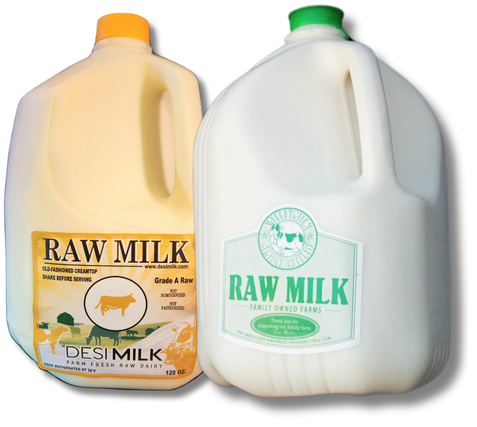
Dairy
Valley Milk Simply Bottled & DESI Milk Raw Cow Milk
*Recalled ProductAffected product expiration dates: DEC 23 2024 through DEC 30 2024
Raw cow milk sold in quart, half-gallon, and gallon plastic jugs.

Pet Food
Monarch Raw Pet Food
Affected products sold at several farmers markets in California, and did not include lot numbers.
Pet Food
Wild Coast LLC - Boneless Free Range Chicken Formula
Affected products are sold primarily in the Pacific Northwest and include Lots #22660 and #22664 with a Best By Date 12/2025Riverside University Health System - Public Health Contact Information
- Disease Control: (951) 358-5107
- Reporting Sick Animals: Contact Environmental Health (888) 722-4234
- Requesting PPE or Vaccine Clinics: (951) 358-7125

